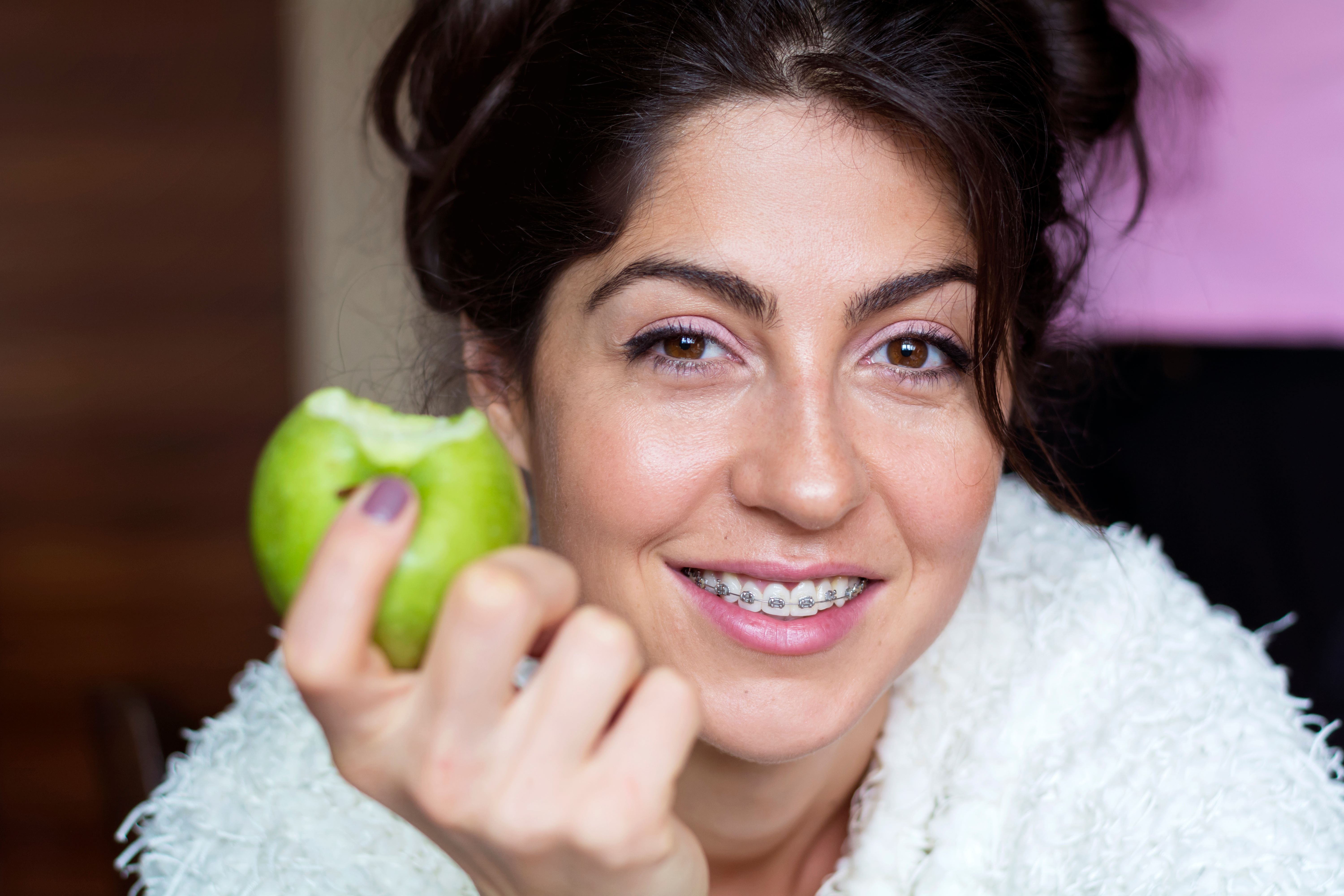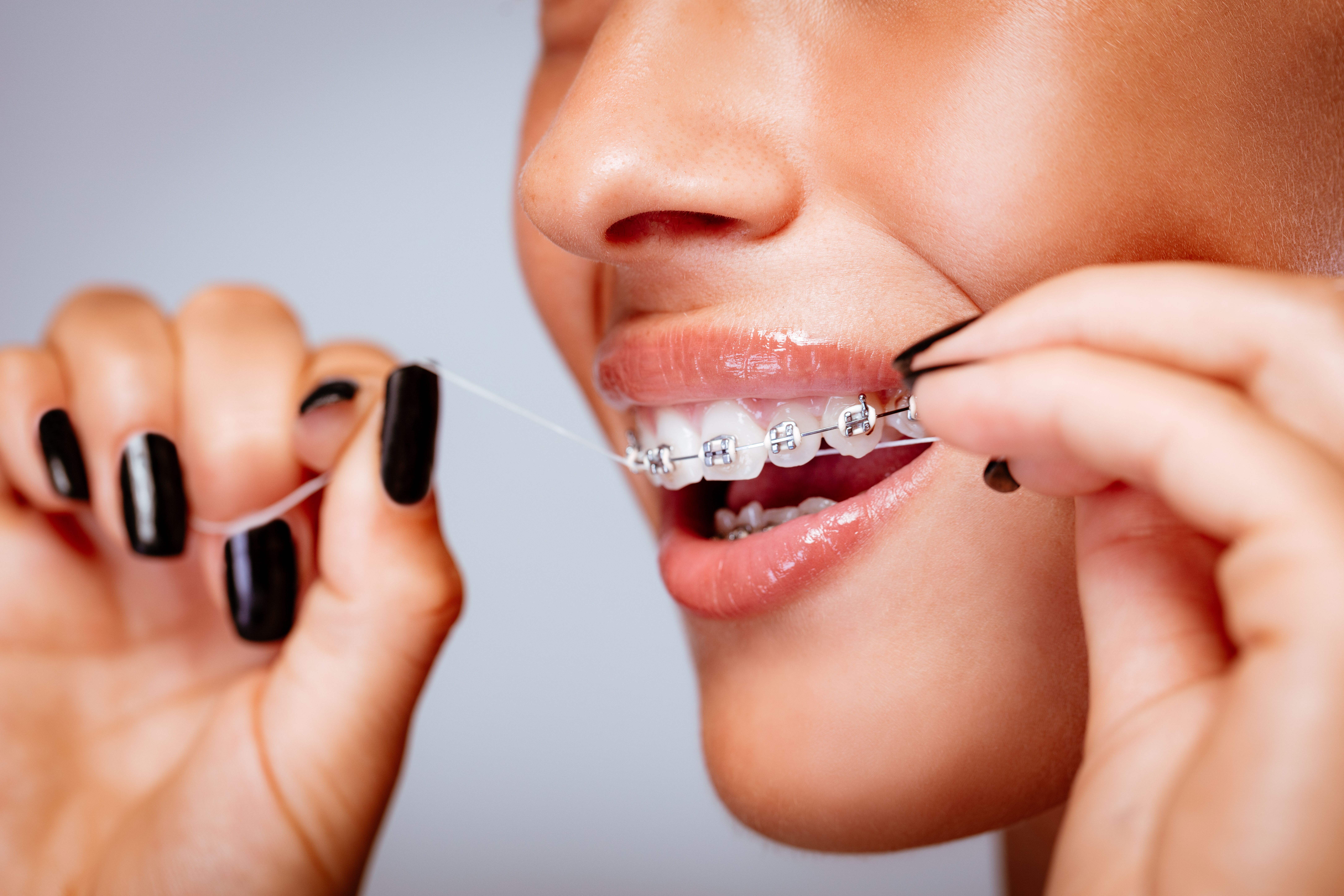Life with Braces: A Guide to Eating, Speaking, and Daily Care for Adults
Embarking on the journey of adult orthodontic treatment is an exciting step toward achieving a confident and healthy smile. However, as you begin your orthodontic journey with braces, it's natural to question how they will impact your day-to-day life. In this comprehensive guide, we'll explore the ins and outs of life with braces as an adult, specifically focusing on eating, speaking, and daily care.
Adjusting to Eating with Braces
Eating with braces may require adjustments to your usual diet, but with a little patience and knowledge, you can continue enjoying various foods.
Foods to Avoid
To protect your braces and prevent any damage, avoiding certain foods that can be particularly challenging to eat with braces is important. Here are some examples:
- Sticky or chewy foods: Caramels, taffy, gummy candies, and chewing gum can get stuck in your braces and are challenging to clean.
- Hard foods: Hard candies, nuts, popcorn, and ice cubes can exert excessive pressure on your braces, potentially causing brackets or wires to break.
- Crunchy foods: Foods like chips, hard pretzels, and raw carrots can risk damaging your braces or getting stuck between the wires and brackets.

Braces-Friendly Food Options
- Soft foods: Opt for softer options like mashed potatoes, cooked vegetables, yogurt, soup, pasta, and soft fruits like bananas and berries.
- Protein sources: Enjoy lean meats, fish, eggs, and tofu, essential nutrients for overall health.
- Dairy products: Milk, cheese, and yogurt are excellent sources of calcium, promoting strong teeth and bones.
- Healthy snacks: Consider softer snacks such as smoothies, soft granola bars, applesauce, or soft cheese slices.
Tips for Chewing
Chewing with braces may initially feel different, but don't worry—it's a skill you'll quickly adapt to. Here are some tips to help you chew comfortably:
- Take smaller bites: Cut your food into smaller, manageable pieces to make chewing easier and less taxing on your braces.
- Chew slowly: Be mindful of your chewing speed, allowing your teeth to effectively break down the food without applying excessive force.
- Use both sides of your mouth: Distribute the chewing load evenly to avoid putting too much pressure on a specific area.
Oral Hygiene after Meals
Maintaining proper oral hygiene is crucial during your orthodontic treatment. Food particles can easily get trapped in your braces, leading to plaque buildup and potential oral health issues. Follow these steps after each meal:
- Rinse your mouth: Swish water around your mouth to dislodge any food particles stuck in your braces.
- Brush thoroughly: Use a soft bristle and fluoride toothpaste to clean your teeth, brackets, and wires. Brush at a 45-degree angle, gently moving the bristles in small circular motions.
- Floss carefully: Use floss threaders or orthodontic flossers designed for braces to clean between your teeth and under the wires.
Hence, you can enjoy meals without compromising your orthodontic treatment by being mindful of your food choices, adapting your chewing technique, and maintaining proper oral hygiene. Furthermore, follow your orthodontist's guidelines and consult with them if you have any diet-related concerns or questions.
Tips for Speaking Clearly
Braces may temporarily affect your speech as your tongue and mouth adjust to the presence of brackets and wires. Rest assured that speech changes are usually minor and will improve over time.
Practice, Practice, Practice
Practicing speaking is one of the most effective ways to improve your speech with braces. Here are a few exercises you can try:
- Read aloud: Choose a book, magazine, or any written material and read it aloud to yourself or someone else. This exercise helps you become more comfortable pronouncing words with your braces.
- Tongue twisters: Tongue twisters are fun and challenging exercises that can help improve your speech clarity. Repeat tongue twisters slowly at first, gradually increasing your speed as you become more comfortable.
- Singing or reciting: Singing or reciting your favorite songs, poems, or speeches can be an enjoyable way to enhance your speech while incorporating rhythm and flow.
Pay Attention to Articulation
Focus on articulating your words clearly by enunciating each sound. Be mindful of changes in how your tongue and lips interact with the braces. Moreover, pay attention to the placement of your tongue when forming specific sounds and make necessary adjustments.
Slow Down and Take Your Time
Speaking too quickly can make it harder to articulate words clearly, especially when adapting to braces. Therefore, slow down your speech pace and take your time to pronounce each word accurately. This can significantly improve your speech clarity.
Seek Professional Help if Needed
If you experience persistent speech difficulties that do not improve over time or significantly impact your daily communication, it may be beneficial to seek professional help. Furthermore, consult your orthodontist or a speech therapist who can evaluate your situation and provide targeted exercises or guidance to address any speech challenges.
Remember, it's normal to experience some speech adjustments when you first get braces. Moreover, with practice, patience, and these tips, you'll find that your speech will gradually return to normal as you become more accustomed to wearing braces.
Daily Care and Maintenance
Proper care and braces maintenance is essential for successful orthodontic treatment and excellent oral health. Here are some tips to incorporate into your daily routine:
Brushing with Braces
Brushing your teeth becomes even more important when you have braces, as food particles and plaque can easily get trapped around the brackets and wires. Follow these steps for effective brushing:
- Use a soft-bristled toothbrush: Choose a toothbrush with soft bristles to avoid damaging the braces and gums.
- Angle the brush: Hold your toothbrush at a 45-degree angle and gently brush in small circular motions, ensuring you cover all surfaces of your teeth, brackets, and wires.
- Pay attention to the gumline: Brush along the gumline to remove any plaque buildup.
- Clean the brackets and wires: Brush carefully around the brackets and wires, making sure to remove any food particles or debris.
- Remember the chewing surfaces: Brush the chewing surfaces of your teeth to remove any food particles that may have accumulated.
- Rinse thoroughly: Rinse your mouth with water to remove any remaining toothpaste or debris.
Flossing Techniques
- Use floss threaders or orthodontic flossers: These tools are designed to help you navigate the wires and brackets. Thread the floss carefully under the wire and between your teeth, then floss as usual.

- Consider interdental brushes or water flossers: These can be effective alternatives or additions to traditional flossing. Interdental brushes are small brushes designed to clean between brackets and wires, while water flossers use water to remove debris.
Interdental Cleaning
- Interdental brushes: These small brushes come in different sizes and can be used to clean between brackets and wires. Gently insert the meeting into the gaps and move it back and forth to remove debris.
- Water flossers: Water flossers use a pulsating stream of water to remove plaque and food particles. Point the nozzle between your teeth and along the gumline to effectively clean the areas around your braces.
Regular Check-ups
Regular visits to your orthodontist are crucial during your orthodontic treatment. Scheduled appointments allow your orthodontist to monitor your progress, make necessary adjustments to your braces, and address any concerns you may have. Furthermore, be sure to attend these appointments as recommended.
By following these daily care and maintenance tips, you can keep your braces clean and minimize the risk of oral health issues. Remember to be gentle when brushing, flossing, and use the appropriate tools for interdental cleaning. Moreover, your orthodontist will provide personalized guidance and recommendations specific to your orthodontic treatment.
Dealing with Discomfort
During your orthodontic treatment, it's common to experience some discomfort or soreness as your teeth adjust to the braces. Here are some tips to help you manage and alleviate any pain that may arise:
Managing Soreness
- Over-the-counter pain relievers: Non-prescription pain relievers like acetaminophen or ibuprofen can help reduce soreness. Furthermore, follow the instructions and consult your healthcare provider for any concerns.
- Saltwater rinses: Dissolve half a teaspoon of salt in 8 ounces of warm water and rinse your mouth with this solution several times daily. This can help soothe sore gums and alleviate discomfort.
- Orthodontic wax: If certain parts of your braces are irritating, orthodontic wax can provide relief. Apply a small amount of wax onto the braces or wires, causing friction or irritation.
Dealing with Ulcers and Irritation
Sometimes, braces can cause ulcers or small sores inside your mouth due to friction. Following are a few tips to address ulcers and irritation:
- As mentioned, saltwater rinses: Rinse your mouth with a saltwater solution. This can help soothe ulcers and promote healing.
- Topical oral gels: Over-the-counter oral gels designed for oral sores can provide temporary relief. Apply a small amount to the affected area as directed on the packaging.
- Orthodontic silicone covers: These small silicone covers can be placed over irritating brackets or wires, creating a barrier between the braces and the inside of your mouth.
Emergency Situations
In rare cases, you may encounter orthodontic emergencies that require immediate attention. Here are a few examples and how to handle them:
- Loose bracket: If a bracket becomes loose but is still attached to the wire, keep it in place and contact your orthodontist as soon as possible for guidance.
- Broken wire: If a wire breaks or protrudes and causes discomfort or irritation, use a clean pencil eraser to push the wire into a more comfortable position gently. If necessary, cover the end with orthodontic wax and seek assistance from your orthodontist.
- Trauma or injury: In case of trauma or injury to your mouth or braces, seek immediate dental or orthodontic care. Furthermore, contact your orthodontist or an emergency dental clinic for guidance.
- Remember, if you experience persistent or severe pain or encounter any issues you're unsure how to handle, it's important to consult your orthodontist. They will be able to provide you with specific advice and address any concerns you may have.
Conclusion
Remember, adult orthodontic treatment is an investment in your long-term oral health and overall well-being. By following the guidelines, you'll be well-equipped to navigate life with braces, from adjusting your eating habits to speaking clearly and caring for your braces properly.
Moreover, keep your eye on the end goal—a beautiful, confident smile—and know your efforts will be rewarded. So, embrace the journey, stay committed, and soon enough, you'll be flashing a smile you're proud to share with the world!
If you have any further questions or need additional support, don't hesitate to contact your orthodontist.
Contact your Danville dentist, Dr. Hoss Abar, DDS, MSD, at Danville Orthodontics today to learn about Life with Braces: A Guide to Eating, Speaking, and Daily Care for Adults.
Resource:
*This media/content or any other on this website does not prescribe, recommend, or prevent any treatment or procedure. Therefore, we highly recommend that you get the advice of a qualified dentist or other medical practitioners regarding your specific dental condition*
